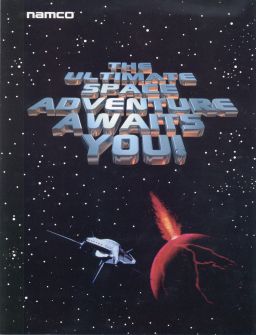Galaxian3: Project Dragoon
This article needs additional citations for verification. (October 2017) |
| Galaxian 3 | |
|---|---|
 North American arcade flyer | |
| Developer(s) | Namco |
| Publisher(s) | Namco |
| Composer(s) | Shinji Hosoe Ayako Saso |
| Platform(s) | Arcade, PlayStation |
| Release | Attraction April 1, 1990 Arcade (Project Dragoon) 1992 PlayStation April 4, 1996 |
| Genre(s) | First-person shooter |
| Mode(s) | Up to 6/16/28 players simultaneously |
| Arcade system | Namco System 21 boards with LaserDisc drives |
Galaxian 3 (also known as Galaxian³: Project Dragoon) is an amusement park attraction with elements of an arcade game released by Namco in 1990 which was later released as a scaled-down arcade cabinet in 1994. It is a walk-in style arcade game run upon a hybrid of laserdisc and traditional arcade hardware. It uses multiple Namco System 21 boards with synchronized laserdisc players (up to sixteen boards and laserdisc players in the original park attraction, and two in the "Theater 6" version) to create the pre-rendered backgrounds of the game. Each player shares the same life meter and takes the role of one of many stationary gunner positions (up to twenty-eight players for the park attraction, and six for the Theater 6 version),[2] who are defending a spaceship called the "Dragoon" (hence the later subtitle) against an onslaught of enemy ships as the players try to destroy a space station called the Cannon Seed. It was one of only two games that were released for Namco's "Theater 6" arcade system, the other being its immediate sequel, Attack of the Zolgear, which was released in 1994. A simplified 4 player version was later released for the original Sony Playstation in Japan and Europe.
Specifications

Galaxian 3 was originally an attraction that debuted in prototype form (labelled as "M8774-B") at Expo '90 in Osaka. The production version ("M8774-D") later debuted at Namco's Tokyo theme park Wonder Eggs in 1990 with the Project Dragoon subtitle, which would be used for all subsequent versions. Four years later, the scaled-down, Theater 6 arcade version ("M8774-E") was released (with its sequel, Attack of the Zolgear labelled as "M9083-D"). As opposed to the 6-player arcade version, the theme park version had a 360-degree display using 16 projectors each being 120 inches diagonally and seated 28 players simultaneously (in a hydraulic gaming arena). There was also a simplified version of the attraction ("M8774-C"), for 16 players which did not have as many of the features as the original 28-player version. The attraction eventually closed with the rest of the Wonder Eggs theme park in 2000.
Story
Galaxian 3 was set in the time when humanity made their first attempt to travel beyond their Solar System, and rushes into the days of space exploration. Several of the planets, including the fictitious planet Alpha, which is located at the edge of the galaxy cut off the communications, following an observational data of uncontrollable crustal movements. As a response to this incident, the United Galaxy Space Force (UGSF) is sent out to investigate only to discover the first threat to humanity: the Unknown Intellectual Mechanized Species (UIMS), a race of machines which are of various sizes, made up of inorganic substances, one of which is called "Live-Weapon". A countermeasure agency was started, and the UGSF were kept up with a series of investigations, relating to the UIMS. After the result in which they had kept on developing as a weapon, they became an ultimate doomsday planet-busting weapon, "Cannon Seed", which could compress the planet's internal energy and discharge it to destroy an entire planet, turning it into fragments. This was the last from the UGSF supervisory satellite after giving a report about the Cannon Seed aiming at the Earth. The bravest elite gunners went on board the UGSF's most powerful spacecraft, Dragoon (which is where the later subtitle of Project Dragoon comes from).
Ports
The game was ported to the PlayStation in Japan in 1995, and in Europe on April 4, 1996, which includes four-player support instead of the arcade's six-player support and letterboxing, as well as a bonus game called The Rising of Gourb.
The Rising of Gourb
The Rising of Gourb is a bonus game, which was created specifically for the Sony PlayStation port. Its story is set some years after Project Dragoon, where humankind is again faced with a mysterious threat - a new group of fighting machines are called UIMS-δ, having traced to an evolutionary process and created by the gigantic space fortress known as Gourb, which was separated from that of the original UIMS. They have begun a revenge against humanity for that reason. Responding to this, the UGSF send out a deployment of the improved Dragoon to destroy them. It also only allowed up to four players to play simultaneously (as opposed to six, sixteen or 28).
References
- ^ "Namco System 21 (Concept) - Giant Bomb". Giant Bomb. Retrieved 21 June 2017.
- ^ "System 16 - Namco Medium Sized Attractions Hardware (Namco)". System16.com. Retrieved 12 October 2017.
